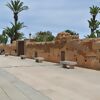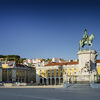17 Nights | 17N Portuguese Pursuit 3N Pre Iguazu Falls
You will visit the following 8 places:

Casablanca
Casablanca is a city in western Morocco, located on the Atlantic Ocean. It is the capital of the Grand Casablanca region. With a population of 3,299,428, Casablanca is Morocco's largest city as well as its chief port. It's also the biggest city in the Maghreb. Casablanca is considered the economic and business center of Morocco, while the political capital city of Morocco is Rabat.

Agadir
Agadir is a major city in southwest Morocco, capital of the Agadir province and the Sous-Massa-Draa economic region. The city is located on the shore of the Atlantic Ocean, near the foot of the Atlas Mountains, just north of the point where the Souss River flows into the ocean. A resort destination, it's known for its golf courses, wide crescent beach and seaside promenade lined with cafes, restaurants and bars.

Maceió
Maceió is the capital and the largest city of the coastal state Alagoas, Brazil. The name "maceió" is of indian origin, and designates the natural spontaneously courses of water which flow out of the soil. Most maceiós flow to the sea, but some get trapped and form lakes ("lagoas", in Portuguese). There are plenty of maceiós and lakes in this part of Brazil; because of this, the city was named Maceió, and the State, Alagoas. The new Zumbi dos Palmares International Airport connects Maceió with many Brazilian cities and also operates some international flights. The city is home to the Federal University of Alagoas. $$https://www.youtube.com/watch?v=i9P5TaBdVts$$

Salvador
Salvador is the largest-city on the northeast coast of Brazil and the capital of the Northeastern Brazilian state of Bahia. Salvador is also known as Brazil's capital of happiness due to its easygoing population and countless popular outdoor parties, including its street carnival. The first colonial capital of Brazil, the city is one of the oldest in the country and in the New World. For a long time, it was simply known as Bahia, and appears under that name (or as Salvador da Bahia, Salvador of Bahia so as to differentiate it from other Brazilian cities of the same name) on many maps and books from before the mid-20th century. Salvador is the third most populous Brazilian city, after São Paulo and Rio de Janeiro, and it is the ninth most populous city in Latin America. $$https://www.youtube.com/watch?v=-hpxgO6-RZs$$

Lisbon
The capital of Portugal, Lisbon (Portuguese: Lisboa) has experienced a renaissance in recent years, with a contemporary culture that is alive and thriving and making its mark in today's Europe. Perched on the edge of the Atlantic Ocean, Lisbon is one of the rare Western European cities that faces the ocean and uses water as an element that defines the city. Lisbon enchants travellers with its white-bleached limestone buildings, intimate alleyways, and an easy-going charm that makes it a popular year-round destination.

Recife
Recife, the capital of Pernambuco, is one of the largest and most important cities on the northeastern coast of Brazil. Known for its large scale production of sugar cane, its name is an allusion to the stone reefs that are present by the city's shores. The many rivers, small islands and over 50 bridges found in Recife city centre characterise its geography and led to the city being called the "Brazilian Venice." Recife stands out as a major tourist attraction of the Northeast, both for its beaches and for its historic sites, dating back to both the Portuguese and the Dutch colonization of the region. The beach of Porto de Galinhas, 60 kilometers (37 mi) south of the city, has been repeatedly awarded the title of best beach in Brazil and has drawn many tourists. The Historic Centre of Olinda, 7 kilometers (4.3 mi) north of the city, was declared a UNESCO World Heritage site in 1982, and both cities' Brazilian Carnival are among the world's most famous.

Rio de Janeiro
Rio de Janeiro or just simply Rio, is one of the most visited cities in the Southern Hemisphere and is known for its natural settings, Carnival, samba, bossa nova and balneario beaches such as Barra da Tijuca, Copacabana, Ipanema and Leblon. The city has a remarkable architectural heritage, some of the country’s best museums and galleries, superb restaurants and a vibrant nightlife. With so much to see and do, Rio can easily occupy a week and you may well find it difficult to drag yourself away. As Rio achieved independence from the Portuguese rulers, the city expanded politically, culturally, economically and architecturally.








